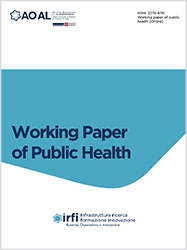A feasibility esplorative study of a novel modality of using patient reported outcomes for patients with rare cancers and melanoma (prosexplor).

All claims expressed in this article are solely those of the authors and do not necessarily represent those of their affiliated organizations, or those of the publisher, the editors and the reviewers. Any product that may be evaluated in this article or claim that may be made by its manufacturer is not guaranteed or endorsed by the publisher.
Objectives: This study tested the feasibility of using a simplified Patient Reported Outcomes questionnaire (sPQs) in routine clinical practice. Methodology: A baseline questionnaire was completed by patients before starting treatment and in the interval time between courses (a total of 4 questionnaires). The results were communicated to a data manager who alerted the oncologist in case of replies differing from the basal/previous. The patient was referred to the nurse or general practitioner or specialist. A satisfaction survey was also done. Results: In a 3-months interval, 27 patients were enrolled. Fatigue and nausea were the most frequent symptoms reported as worsening. The oncologist managed toxicities in 4 cases, therapy variations were recommended by the nurse in 14 cases, visits was performed in 6 patients, 1 patient was hospitalized. None of patients had unplanned accesses to the emergency room or to the hospital. The questionnaire was judged simple and useful. Conclusions: The use of sPQs in the routine clinical practice was feasible and well accepted by patients. sPQs allowed to promptly recognize and manage toxicities reducing to zero unplanned accesses.
PAGEPress has chosen to apply the Creative Commons Attribution NonCommercial 4.0 International License (CC BY-NC 4.0) to all manuscripts to be published.

 https://doi.org/10.4081/wpph.2019.9217
https://doi.org/10.4081/wpph.2019.9217




